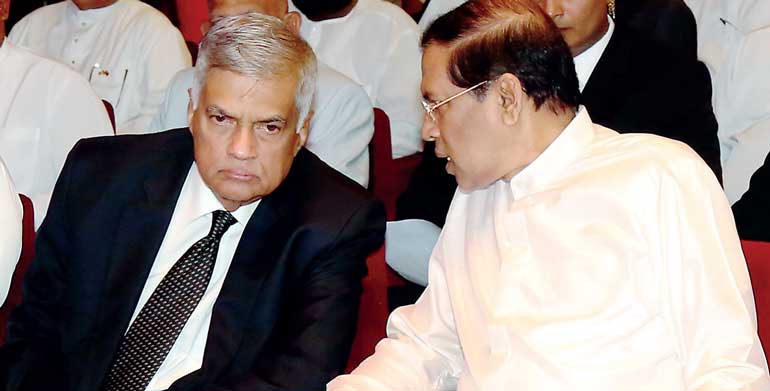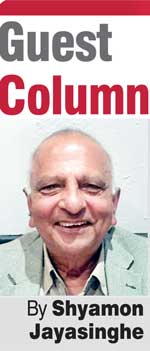Wednesday Feb 18, 2026
Wednesday Feb 18, 2026
Tuesday, 23 January 2018 00:00 - - {{hitsCtrl.values.hits}}

Writers for good governance in Sri Lanka like me, can only pray that things will sort out and become stable after that result; that President Maithripala and the Prime Minister will resume to work harmoniously together; that the revolution is completed and its promised package of a transformed political system is signed, sealed and delivered to the people of our country. This alone will constitute the path of hope for Sri Lanka
The challenge before our country is to institute a transformed system, because most of our political ills are a functional result of a poor system. Our politicians and our political culture is a dependent outcome of bad system. This systemic change, above all, demands a change
in constitution
Root of today’s confusion
The revolution of 8 January 2015 was never a completed task. The election results at the general elections that followed did not yield a big enough result for the UNP, Maithripala Sirisena’s principal political partner, to form a strong government with the new President.
The range of promised tasks that had to be performed to complete the transformation of political life in the island and satisfy the electorate was so vast and radical that it all needed a near absolute majority. For various reasons, this outcome was not achieved.
The root of today’s confusion lies there and nowhere else. Those interested in trying to assess the unfolding political situation have to bear this central issue in mind if they are to get anywhere as far as understanding is concerned. Just hitting here and there won’t help.
Clout of the deposed regime
The related subsidiary factor in the confusion-equation that ensued was that the deposed regime of the Rajapaksa family had enough Parliamentary clout in numbers to worry the Government and cause destabilisation.
There isn’t any point in saying that an Opposition in a democracy should allow the Government some time- space to deliver and only thereafter go on the onslaught. This is theory and it doesn’t belong to the real world of Third World politics.
The troubling and worrisome factor working within the Opposition, now headed by the former President, is that the latter are under siege with a the Sword of Damocles hanging over their necks. The charges of corruption and murder and fraud exposed and bandied about during election time are so serious that many in the Opposition headed by “the family,” could land in jail if proved in court; concomitantly, these individuals would also automatically lose their civic rights to participate in politics in the future.
Proverbial pickpocket
The fear was traumatic. The only way out for the Opposition is to utilise the numbers they had in Parliament and outside in the broad electorate to campaign and harass the new President and the Government. This is how ‘Mahinda Sulanga,’ meetings started.
Like the proverbial pickpocket, the Opposition cried foul against the Yahapalanaya Government with a return charge of corruption. It was sand thrown in the eyes to deceive the people. To an extent that was successful politics. The successful politicisation of the bond issue was a case in point.
Other factors
The dragging of cases meant to bring the members of the former regime to court made matters worse. Persons loyal to the former regime continued within the ranks of various government agencies, obstructing many a move. The media, suddenly released from oppression and finding freedom, began a relentless criticism over the Government. This is known as the paradox of liberty and tolerance. Opposition elements utilise the new freedom to destroy the very freedom from oppression that the people have won; doing so, by attempting to get on the back of that freedom.
Nor could any government perform significantly in the economy, especially for the first few years, given the perilous star of finances that the previous regime had created by irresponsible fiscal measures, childish and mindless extravaganza and corruption, unpayable national debt and visionless economic management.
The media under the incompetent previous minister of this Government failed in its task to communicate with the people about these difficulties and about the solutions that need time to give effect to. The present Minister Mangala Samaraweera, being a media expert himself, has begun delivering what the media had to deliver in this context. The delay did cost the incumbent Government.
President’s SLFP
The other factor, also related to the inadequate Parliamentary majority, was President Sirisena’s strategy of luring onto his side some numbers of the SLFP that were with Mahinda Rajapaksa. The strategy did work to some extent since the Yahapalanaya Government was able to pass some important legislation in Parliament and also present some stability within the well of Parliament. The invaluable passage of the 19th Amendment was a victory for both the President and the Prime Minister – particularly the President who dared to stay inside Parliament until that was passed. Many other useful and nationally important laws were passed during the last three years including those related to the setting up of Independent Commissions, the freedom of the public to obtain information about the government and so on. Besides, Government was able to pass all its budgets comfortably.
Constitutional change
The crucial law that has yet to be passed relates to the fundamental law of the country and that is the Constitution. One cannot expect any change in the rules of the game of politics and governance without a change in constitution; that, alone, can result in a better arrangement for Parliament to have better quality MPs and ensure a fundamental change to the way the way the government is run.
The current system of the JR constitution leading to an absolute executive must go as soon as possible. This was one of the key things for which a mandate was obtained. The public demand for that grew so much that even the former President had promised the people, that if he won election the first thing he would do is to abolish the executive presidency! An ironical and even satirical statement from the man who abused that constitution and unleashed oppression in the island.
Progress of dualism
What has thus far happened in this regard, is a hopeless halfway path of a restricted executive presidency; neither here nor there. Surprisingly the resultant dualism did work thus far, given the good sense and maturity on the part of President Sirisena and Prime Minister Ranil Wickremesinghe.
The duo has worked well together to deliver a visible change in the country: Sri Lankan people are free now. For the last three years we have not seen any state-sponsored murders of dissenting journalists and politicians – no white vans and night hit-squads. People are free to protest for anything. Trade unions, including the unprofessionally-behaving GMOA, are let out. Villagers are not shot for demanding their right to clean water.
Courts aren’t conducted in Temple Trees anymore. We do not have a Chief Justice who is ready to give verdicts that Government leaders desire. We have a meticulously honourable Chief Justice today. Dissentients are not found missing. Pedestrians are not forced by cops to turn their backs and hold onto the nearest wall when VIPs like Gota pass, in their pomp and glory.
The economy has started a turn for the better. The national debt factor is intelligently handled. Only the cussed, the politically illiterate and the Rajapaksa-bent diehards can deny all this and much more.
Stress on dualism
On the other hand, during these times of political stress with the Local Government elections on, dualism is under serious stress. Maithripala’s strategy of building up an SLFP under his political leadership has caused much of the stress and burn of dualism. His attempts seem to have divided the SLFP ranks in the country, thus weakening Mahinda Rajapaksa’s Pohottuwa. However, the heat generated from the political need to differentiate himself from the UNP during election time is becoming dysfunctional. Maithripala’s SLFP can succeed in the country only on the basis of such a differentiation from the UNP.
This development, once again, shows the weakness of an executive president system where the President takes on a political mantle.
Prayer for a change in system
The election results will, no doubt, have big impact on national politics in the days to come. Writers for good governance in Sri Lanka like me, can only pray that things will sort out and become stable after that result; that President Maithripala and the Prime Minister will resume to work harmoniously together; that the revolution is completed and its promised package of a transformed political system is signed, sealed and delivered to the people of our country. This alone will constitute the path of hope for Sri Lanka. The challenge before our country is to institute a transformed system, because most of our political ills are a functional result of a poor system. Our politicians and our political culture is a dependent outcome of bad system. The systemic change, above all, demands a change in constitution.
(The writer can be reached via [email protected].)